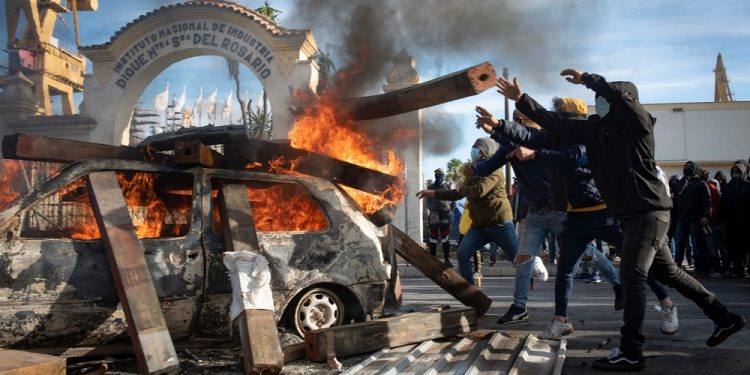By Internationalist Struggle, a section of the IWU-FI, Spanish State.
18 November 2021. On Tuesday, 16 November, the industrial metal workers in Cadiz went on an indefinite strike because of the deadlock in the negotiation of the collective agreement. The bosses want to impose severe cuts in wages and rights: they are demanding the removal of two extra payments, increasing the working day, taking away bonuses and refusing to recover those for toxic, painful and dangerous risks, and they also want to create a new category below the specialist. The workers called two days of strike action in November, which were a success. But the bosses did not give in and, after several assemblies and despite the obstacles put up by the official trade unions, CCOO and UGT, an all-out strike was called. Its impact, especially in the Bay of Cadiz, has been absolute, with strong mobilisations and clashes with the police.
The workers want to prevent the continuation of the process of deindustrialisation and deterioration of working conditions that have been going on for years. The two Airbus factories (one of which is threatened with imminent closure and has been fighting hard), the three Navantia factories (public shipyards) and the Dragados factory, are all the industries that remain in the area. In a clear commitment to tourism by the different central and regional governments, they have allowed the entire factory to be dismantled. For years, the province of Cadiz has had the highest unemployment rates in Spain.
Subcontracting is brutal and is the tonic in the shipyards: a weapon of mass destruction of labour rights. The division of thousands of workers in hundreds of companies, the continuous disregard of the committees of the main company and the scarce power of the union delegates of the subcontractors, most times employers’ relatives and trusted people, has made the workers, most of them temporary subcontractors, raise their voices and organise themselves. One of the most recent conflicts occurred when employers dismissed two comrades from the CTM union who dared to call a workers’ assembly when the works council would not do so.
The negotiating table of the agreement is controlled by CCOO and UGT, however, the participation of the alternative unions of Cadiz is very important, which base their struggle on the mobilisation of the workers and the taking of decisions from the assemblies, as they do not trust the manoeuvres of the bureaucratic central organisations, with a long history of concessions in favour of the bosses. The core of the strike is in the Bay of Cadiz. To prevent the strike from spreading throughout the province, the Andalusian regional government has called on both sides to mediate. But in the streets, there is a strong will to fight.
This is not an exception, but the general trend throughout Spain. The bosses want to take advantage of the effects of the pandemic to activate industrial relocation plans and impose closures and enormous setbacks to working conditions. To do so, it has total impunity in the dismissals allowed by successive labour reforms, especially that of the PP government in 2012, which the PSOE-IU/Podemos government has still not repealed.
Coinciding with the strike in Cadiz, on Wednesday, another general strike completely paralysed the Galician region of Amariña in Lugo against industrial dismantling and filled the streets of Burela. It is the same struggle that the subcontract workers are carrying on for the closure of Nissan. That is why the indefinite strike of the metalworkers of Cadiz is the strike of the whole working class, and we must raise the broadest solidarity.
Stop the industrial dismantling, no more loss of labour rights. No more subcontracting and division. Repeal the 2012 labour reform now. All control of the struggle in the hands of the assemblies. Long live the struggle of the working class.













